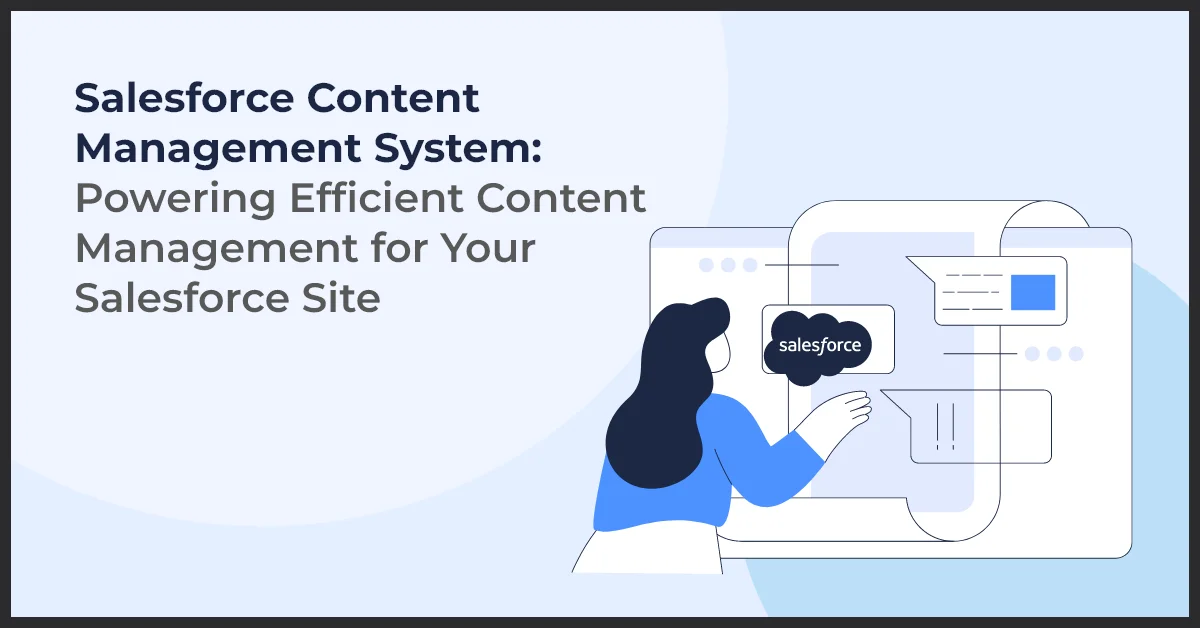Salesforce Content Management System: Powering Efficient Content Management for Your Salesforce Site

Published on: October 31, 2023
Updated on: July 11, 2024
555 Views
- Salesforce
11 min read
Are you looking for a robust and user-friendly solution to manage your Salesforce content? Look no further than the Salesforce Content Management System (CMS). This innovative platform combines the power of Salesforce with advanced content management capabilities, enabling you to streamline your content management process and deliver engaging experiences to your customers. Whether you're a small business or a large enterprise, utilizing a CMS for managing your Salesforce content can bring numerous benefits to your marketing and sales efforts.
What is the Salesforce Content Management System (CMS)?
The Salesforce Content Management System, also known as Salesforce CMS, is a comprehensive platform designed specifically for managing and organizing content for Salesforce sites. It offers an intuitive interface and a range of features that allow you to efficiently create, publish, and update content, ensuring seamless integration with the rest of your Salesforce tools.
The Importance and Benefits of Using a CMS for Managing Salesforce Content
Managing content within Salesforce can be a challenging task, especially as your business and content library grow. This is where a dedicated CMS comes in handy. A CMS provides a centralized platform for organizing, storing, and distributing content, making it easier for your marketing and sales teams to collaborate, update content, and deliver consistent messaging across multiple channels.
Key Terms to Know
Before diving into the world of Salesforce CMS, it's essential to understand some key terms:
- Salesforce: A leading customer relationship management (CRM) platform that helps businesses manage their interactions and relationships with customers and prospects.
- CMS: Short for Content Management System, it's a software application designed to create, manage, and optimize digital content.
- Content: Refers to any type of information, such as text, images, videos, or documents, that is created and consumed by users.
- Site: A specific web address or domain where your content is published.
- Manage: To oversee, organize, and control various aspects of content creation and distribution.
- Cloud: A remote server infrastructure that allows users to store and access data over the internet instead of a local hard drive.
- Marketing: The process of promoting products or services to attract and retain customers.
- App: An abbreviation for "application," which refers to software programs designed for specific purposes, often used on mobile devices or within web browsers.
- Platform: Refers to a digital infrastructure or framework that supports the development and deployment of various applications and services.
- Commerce: The activity of buying and selling goods and services.
By leveraging Salesforce CMS, your business can enhance content management efficiency, improve collaboration, and deliver personalized experiences to drive customer engagement. Stay ahead of the competition and maximize the potential of your Salesforce site with Salesforce Content Management System.
Understanding Salesforce
Salesforce is a powerful customer relationship management (CRM) platform that helps businesses effectively manage their sales, marketing, and customer support processes.
With Salesforce, businesses can streamline their operations, improve customer relationships, and drive growth. This CRM platform offers a range of features and capabilities to meet the unique needs of different industries and organizations.
Salesforce provides robust tools for managing customer data, tracking leads and opportunities, and automating sales processes. It also offers comprehensive analytics and reporting capabilities, enabling businesses to gain valuable insights and make data-driven decisions.
One key aspect of maximizing the benefits of Salesforce is integrating it with a reliable content management system (CMS). A content management system allows businesses to create, manage, and deliver content seamlessly within the Salesforce platform.
By integrating a content management system with Salesforce, businesses can centralize their content creation and distribution processes. They can easily create and update content, track its performance, and deliver personalized experiences to their customers.
A robust content management system ensures that businesses can efficiently manage and leverage their content assets, such as product information, marketing materials, and customer support resources. It also enables teams to collaborate effectively and maintain consistency across different channels and touchpoints.
Introduction to Salesforce Content Management System (CMS)
In today's digital age, managing content efficiently and effectively is crucial for businesses to stay at the forefront of their industry. This is where the Salesforce Content Management System (CMS) comes into play. In this section, we will delve into the definition, purpose, key features, and benefits of utilizing Salesforce CMS for salesforce content management.
Definition and Purpose of a CMS in the Context of Salesforce
A Content Management System (CMS) is a software application that allows businesses to create, manage, and publish digital content. In the context of Salesforce, a CMS provides a centralized platform to manage all content, ensuring consistency and coherence across various digital channels.
The purpose of a Salesforce CMS is to streamline content creation, collaboration, and distribution processes. It enables businesses to easily create and update content, ensuring it remains up-to-date and meets the changing needs of customers.
Explanation of Key Features and Functionalities of Salesforce CMS
Salesforce CMS offers a wide range of features and functionalities that enhance content management. Some of the key features include:
- Content Creation: Salesforce CMS allows users to easily create and edit content through a user-friendly interface. This feature ensures that content creators can focus on delivering valuable and engaging content without the need for technical expertise.
- Version Control: With Salesforce CMS, businesses can track and manage different versions of content, making it easier to collaborate and maintain a single source of truth.
- Asset Management: The CMS provides a central repository to store and manage digital assets, such as images, videos, and documents. This streamlines the content creation process and ensures that assets are easily searchable and reusable.
- Content Personalization: Salesforce CMS allows businesses to deliver personalized content based on customer preferences, behaviors, and demographics. This feature enhances customer engagement and increases the effectiveness of marketing campaigns.
Benefits of Utilizing Salesforce CMS for Salesforce Content Management
Utilizing Salesforce CMS for salesforce content management offers various benefits for businesses, including:
- Streamlined Workflow: Salesforce CMS simplifies content creation, review, and approval processes, enabling teams to collaborate efficiently and reduce time-to-market.
- Consistency and Coherence: With a centralized CMS, businesses can ensure consistency in their branding, messaging, and content across different digital channels.
- Improved Content Performance: Salesforce CMS provides insights and analytics to track content performance, enabling businesses to optimize their content strategy and drive better results.
- Seamless Integration: As part of the Salesforce ecosystem, Salesforce CMS seamlessly integrates with other Salesforce products, such as Salesforce Commerce, enabling businesses to create a unified customer experience.
Key Components of Salesforce CMS
Content Creation and Management
When it comes to content creation and management, Salesforce CMS offers a range of powerful capabilities. With this system, users have the ability to create and organize content effectively. The intuitive interface allows for easy categorization of content, making it simple to navigate and locate specific pieces of information.
Collaboration is an essential aspect of content creation, and Salesforce CMS understands this. The system provides robust collaboration features, enabling teams to work together seamlessly. Version control ensures that all changes are tracked, allowing for easy identification and restoration of previous versions if needed.
Content Distribution and Publishing
Salesforce CMS takes content distribution to the next level. It provides the ability to distribute content across various channels effortlessly. Whether it is social media, email, or other platforms, you can ensure that your content reaches the right audience at the right time.
Integration with Salesforce marketing automation tools further enhances content publishing capabilities. Marketers can use these tools to automate the process of distributing and promoting content, saving time and effort. The cloud-based nature of Salesforce CMS ensures that content distribution is efficient, scalable, and accessible from anywhere.
Content Personalization and Targeting
Personalized content is key to enhancing customer experience and driving sales. With Salesforce CMS, delivering personalized content to targeted audiences becomes a breeze. The system allows for audience segmentation and targeting, ensuring that each customer receives content that is tailored to their needs and preferences.
By utilizing Salesforce CMS's personalization features, businesses can create meaningful connections with their audience. Customers are more likely to engage with content that speaks directly to them, ultimately increasing conversion rates and fostering brand loyalty.
Content Analytics and Reporting
Salesforce CMS provides valuable insights into content performance through its robust analytics and reporting features. By utilizing these features, businesses can measure the effectiveness of their Salesforce content and make data-driven decisions to optimize their content strategy.
Reporting on key metrics, such as engagement rates and conversion rates, allows businesses to gain a deeper understanding of their audience and adjust their content strategy accordingly. This data-driven approach ensures that each piece of content created is aligned with the needs and preferences of the target audience, maximizing its impact.
Integrating Salesforce CMS with Salesforce Commerce
Introduction to Salesforce Commerce and its integration with Salesforce CMS
In today's competitive e-commerce landscape, having a seamless and efficient content management system is crucial. That's where Salesforce CMS comes into play. By integrating Salesforce CMS with Salesforce Commerce, businesses can unlock a whole new level of productivity and customer experience.
Benefits of leveraging CMS for managing e-commerce content on the Salesforce platform
The integration between Salesforce CMS and Salesforce Commerce offers numerous benefits for businesses. Firstly, it allows for centralized content management across all channels, ensuring consistent messaging and branding. This not only saves valuable time but also enhances brand reputation and customer trust.
Secondly, the integration empowers businesses with advanced content personalization capabilities. By leveraging the power of Salesforce CMS, companies can create personalized experiences for each customer, resulting in improved engagement and higher conversion rates.
Furthermore, with Salesforce CMS, businesses can easily update and publish content across multiple commerce channels with just a few clicks. Say goodbye to the time-consuming manual processes and hello to streamlined content management.
Optimizing content for seamless commerce experiences using Salesforce CMS
One of the key advantages of integrating Salesforce CMS with Salesforce Commerce is the ability to optimize content for seamless commerce experiences. By utilizing the robust features of Salesforce CMS, businesses can easily create and manage product catalogs, promotions, and pricing information.
Moreover, Salesforce CMS enables companies to leverage artificial intelligence and machine learning tools to analyze customer behavior, preferences, and purchase history. This invaluable data can then be used to deliver personalized content and recommendations, resulting in increased customer satisfaction and loyalty.
With Salesforce CMS, businesses can also ensure that their content is mobile-friendly and responsive across all devices. This is crucial considering the exponential growth of mobile commerce in recent years.
To sum it up, integrating Salesforce CMS with Salesforce Commerce brings a wealth of benefits to businesses. From centralized content management to personalized experiences and streamlined commerce, leveraging CMS on the Salesforce platform is a game-changer in the e-commerce industry.
Conclusion
The Salesforce Content Management System (CMS) is a powerful tool that enhances the management of content within the Salesforce platform. By integrating Salesforce CMS with Salesforce Commerce, businesses can streamline their content organization, collaboration, and distribution processes.
Throughout this article, we have explored the key components of Salesforce CMS and learned how it can revolutionize content management. We have also examined real-life case studies and success stories that demonstrate the positive impact Salesforce CMS has had on businesses of all sizes.
In conclusion, Salesforce CMS offers numerous benefits and advantages for salesforce content management. It enables businesses to efficiently create, organize, and distribute content, resulting in improved customer experiences and increased sales.
We strongly encourage businesses to adopt Salesforce CMS and harness its power for better content organization, collaboration, and distribution. By doing so, businesses can greatly enhance their content management processes and ultimately drive success.
Looking ahead, the future of salesforce content management looks promising. As businesses continue to embrace digital transformation and prioritize personalized customer experiences, the role of Salesforce CMS will only become more crucial. With the ability to enhance sales and customer experiences, Salesforce CMS is poised to play a key role in the evolving landscape of salesforce content management.
So, whether you are a small business or a large enterprise, consider incorporating Salesforce CMS into your content management strategy and propel your business towards greater success and growth.



